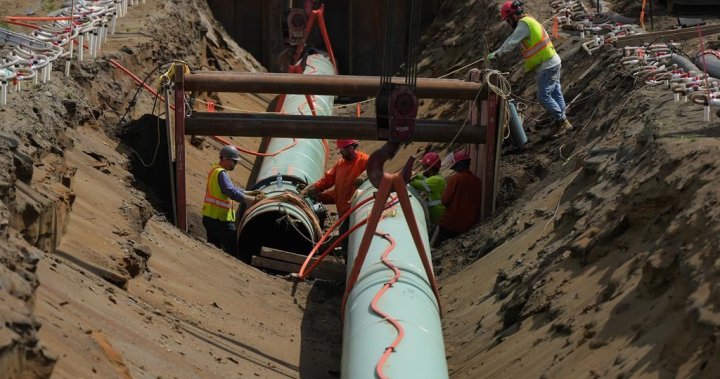The Trans Mountain pipeline expansion project, costing $34 billion, has begun transporting crude oil from Alberta to British Columbia. This project involved twinning an existing pipeline to increase the shipping capacity from 300,000 barrels per day to 890,000 barrels per day. It is expected to provide market access for Canadian oil in global export markets. However, the project has faced opposition from environmental groups and Indigenous communities who are concerned about the environmental impact and potential oil spills.
Despite the completion of the project, there are uncertainties surrounding the federal government’s intention to sell the pipeline. The government purchased the pipeline for $4.5 billion in 2018 to ensure its completion, but has expressed a desire to divest from it in the long term. Experts predict that the government may incur significant losses if it decides to sell the pipeline due to the inflated construction costs. Additionally, Trans Mountain is engaged in a dispute with oil company customers over the new expanded system’s tariffs and tolls, which are intended to cover budget overruns.
The pipeline expansion has been a contentious issue, with legal challenges, protests, and arrests of activists attempting to block construction. Environmental groups, such as the Wilderness Committee, have expressed disappointment over the project’s completion, citing concerns about the potential for catastrophic oil spills and the disregard for Indigenous sovereignty. Activists have raised awareness about the environmental risks associated with oil pipelines and have called for greater protection of the coast from potential spills.
The increased capacity of the pipeline is expected to benefit Canadian oil companies by improving the price they receive for their product. Richard Masson of the University of Calgary’s School of Public Policy has highlighted the significance of the project in providing market access for Canadian oil on a global scale. However, questions remain about the long-term ownership of the pipeline and the financial implications for the government, as well as the ongoing disputes over tariffs and tolls for oil company customers.
While the oil has started flowing through the pipeline into Burnaby, officials have stated that it will not be ready for loading onto ships until mid-May. The Crown corporation Trans Mountain Corp. has attributed budget overruns to factors such as the COVID-19 pandemic, extreme weather conditions, and the need to address archeologically significant sites along the pipeline route. Despite the operational start of the pipeline, concerns persist about the environmental impact, potential oil spills, and the government’s plans for divestment. The completion of the Trans Mountain pipeline project marks a significant milestone in the Canadian oil industry, but it also raises important questions about environmental protection, financial accountability, and Indigenous rights.


